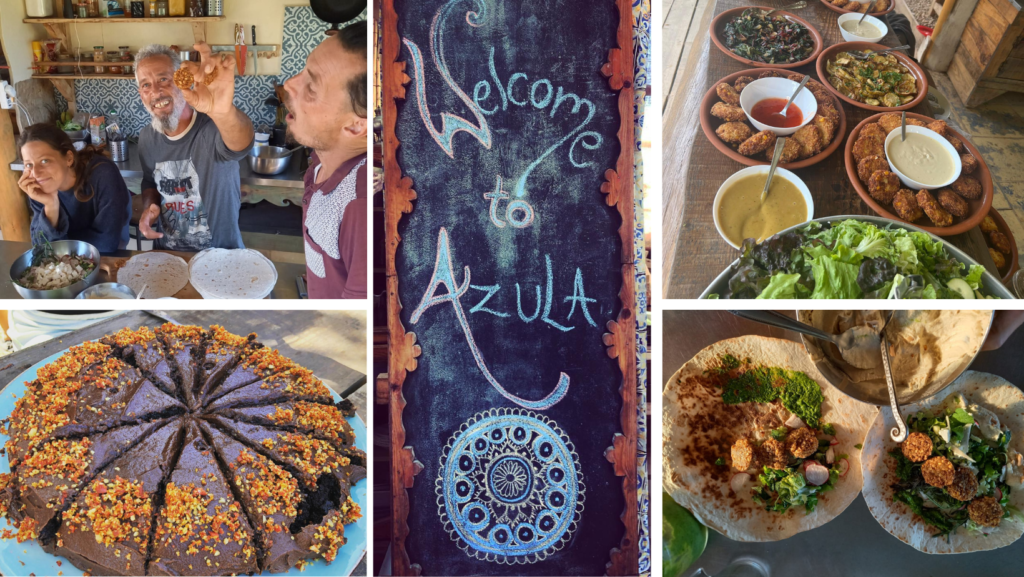Permaculture Design Course (PDC) at Azula: 16th April – 2nd May 2023
Due to popular demand, Azula and Surplus Permaculture Design are excited to invite you to join us for a Permaculture Design Course (PDC) on a stunning 15-hectare Permaculture project in Portugal.
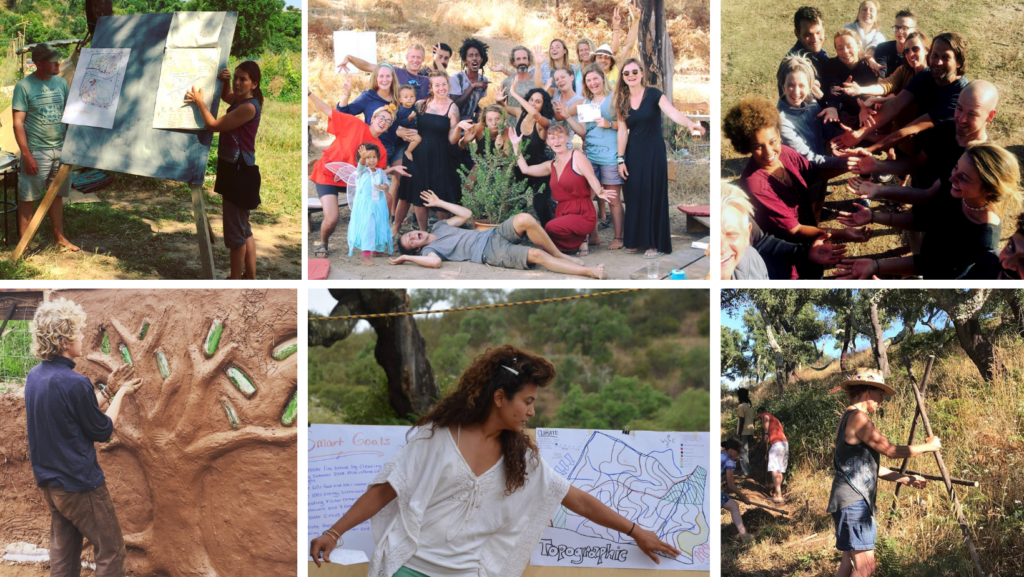
What is a PDC?
A PDC is an internationally-recognized, 72-hour theory course resulting in a Permaculture Design Certificate. It provides a detailed overview of permaculture design set forth by movement founders Bill Mollison and David Holmgren. The PDC is a foundation for further permaculture work and study and is a prerequisite for the Diploma in Permaculture Design offered through The Permaculture Association and Gaia University. A growing number of universities worldwide now accept credits for this PDC. To date, thousands of permaculture designers worldwide have been certified through this course. A global network of educators, ecological activists, consultants and practitioners who are influencing the decisions of major corporations, small businesses and people from all walks of life to change the way we view and design our landscape, our surroundings, our relationships and our daily lives so we can grow the revolution that our planet needs.
What to expect:
This PDC promises to be a unique experience with a specialised schedule to maximise time inside and outside of the classroom. We teach based on our real-life experience with Permaculture from over a decade of practice in various climates. We aim to live, breathe and practise Permaculture daily, and we are passionate about sharing our knowledge with you.
The 72 hours of coursework required to receive a Permaculture Design Certificate will be covered over the 17 days with hands-on practical sessions interwoven throughout, giving you a further opportunity to discover, learn and experiment. It promises to be a PDC full of energy and excitement, where we will teach sessions to accommodate different learning styles combining lectures, group discussions, visual demonstrations, hands-on participatory learning and other creative ways of teaching. Participants will participate in daily farm work from planting to propagating, fermenting to forging; you will see firsthand how integrated permaculture systems are applied and maintained.
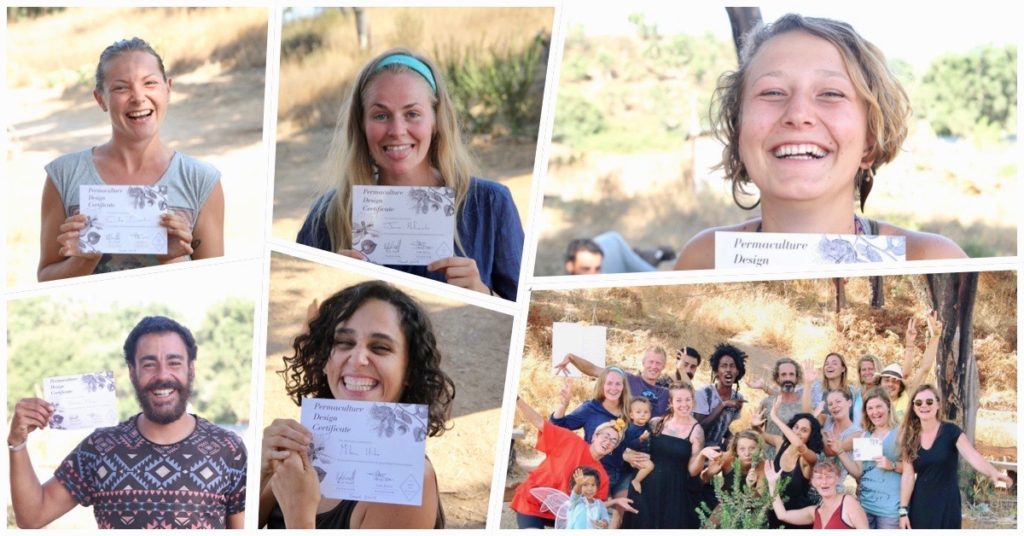
Course details:
The 2-week learning program will be taught in English and cover a broad range of topics applicable to life anywhere on this planet; we will tailor it to the participant’s needs and the location at hand. We will cover every major topic in Bill Mollison’s Permaculture: a Designers Manual in the classroom and around the farm. We allow one day for arrival (16th April) and one for departure (2nd May).
The course curriculum is as follows:
- Philosophies and Ethics underlying permaculture
- Permaculture principles and how to apply them in your daily life
- Systemic thinking: Exploring the connections between elements and how to identify leverage points for change
- Patterns in Nature and how to use them in permaculture design
- Methods of design: How to apply permaculture design tools and strategies to your design problems. How to increase your chance of a successful design by following a well-defined design methodology.
- Climatic factors and strategies: We will cover all the major climate zones and how to work with them.
- Trees, forests and Forest gardening: We will explore how to mimic natural forest systems to create an abundance of food, fibre and fodder.
- Water: catchment, usage, importance, and conservation.
- Holistic management: An animal and land management practice that mimics nature to benefit both grazing stock and biodiversity.
- Understanding Soil: Learn about the physical, chemical and biological properties of the soil and how to work with the soil food web to build new soils, prevent erosion, create a healthy ecosystem and regenerate degraded land.
- Earthworks: Shaping the land to reap the rewards of mother earth and create positive effects on ecological systems
- Natural Building: We explore how to build beautiful, spiritually uplifting homes using locally resourced natural materials.
- Alternative systems: Community living and alternative lifestyles that unite people and the planet. Bioregional organisation, community development, alternative economic systems, permaculture as aid.
- Appropriate technology: Innovative ideas and tools to harvest and create energy
- Gardening: Everything you need to know to produce organic food
- Zone 00: Personal development, self-empowerment and personal goal setting
Design Project
As part of the course, participants will co-create a final design for an actual project using the knowledge they have learned from the PDC and with the assistance of the facilitators. Participants will have the opportunity to design their land if they wish or work on another project presented. (If you are interested in designing your land or a project you are involved in, please get in touch with us for more information.)
Additional Activities
The Azula community wants to create a safe and welcoming place for you to try new things, experiment, laugh and be you, to explore a deeper connection with yourself and the natural world in stillness and tranquillity and with the support of a loving community. You will learn so much during this course, but having a great time is also our goal, so come with an open and relaxed mindset and make the most of your experience!
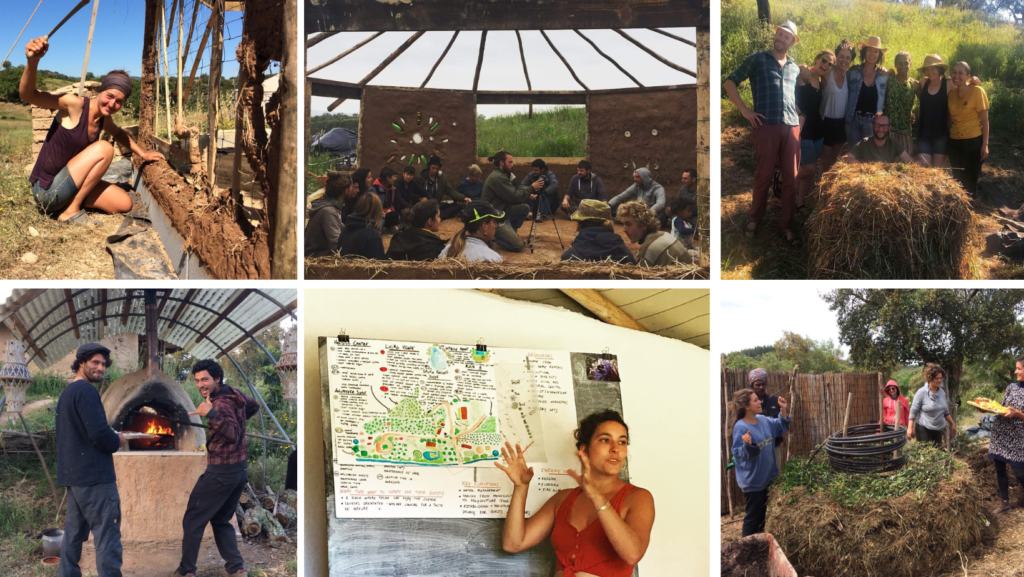
Cost:
Course price: € 1000 (Euros)
This price includes all meals, a comfy bed in a beautiful cob earth dormitory for the duration of the course, transportation to and from the farm to São Luís or Cercal and all course tuition and materials.
We ask all registrants to deposit €100 (plus transaction fee) to secure their spot, and the remaining fees can be paid in cash on arrival or transferred to the Azula bank account.
Azula would like to be as transparent with their finances, as an example to other projects and to be open and honest with visitors and students, who each contribute so much to the building and development of the farm and community. Azula is currently funded by its founders, but they want to create a more resilient economic model by diversifying their income streams. Creating a monthly market, ecological tourism, and running courses and workshops will help develop the systems on the land. The money paid for your course fee will be divided between Azula project and the facilitators, meaning Azula can go forward with developing the project and purchasing materials, and the facilitators can continue with their passion for teaching and inspiring.
Contact information:
Please feel free to email us at info@azula.bio for any additional information you may need.
Meet the Facilitators:
Kyle Smith
After practising horticulture and community living on a kibbutz in Israel when Kyle was 20, he was inspired to pursue a career in horticulture. During his studies, he completed an internship at Soil for Life, a Cape Town-based non-profit organisation empowering people to grow food and create healthy soil. Kyle went on to work at Kirstenbosch Botanical gardens in Cape Town, South Africa, where his primary focuses were conserving indigenous plant species, rehabilitating degraded ecosystems and designing and establishing education gardens on the grounds of the botanic garden. Kyle was later the perennial plant and nursery manager at Panya Project, Thailand, where he spent three years facilitating numerous permaculture design courses, organic gardening courses and designing and co-coordinating the volunteer and internship program. He currently lives in southern Portugal, consulting and teaching for Surplus Permaculture Design. Kyle is passionate about conserving soil ecosystems, plant propagation and small-scale ecological agriculture. He hopes to empower people to grow their own food, become more self-reliant, and regenerate a degraded ecosystem through his unique teaching style and depth of knowledge.
Lola Bryon
Lola Byron is a Permaculture and Natural Building facilitator, practitioner and consultant. After traveling the globe with her young family, connecting with Permaculture projects, she now lives, works, teaches, builds and raises her 2 children in Southern Portugal. Originally from Birmingham, England, she has been a thriving Permaculturist and natural builder since completing her PDC back in 2010. Following this, she was an active urban Permaculturist, designing and implementing various community gardens and co-facilitating natural building and gardening workshops in and around the UK. With a background in studying, then teaching, Fine Art, Sculpture, when she discovered Permaculture and Natural Building, she knew she had found her calling in life. Lola recently set up The Women Natural Builders Collective, a safe and empowering learning space and network for women builders worldwide. She has built and taught internationally, spent 3 years as the Natural Building Manager at Panya Project, Thailand, and has been a consultant and project manager with Surplus Permaculture Design since 2017.
Meet Azula:
Founded in August 2016 in the beautiful Alentejo region of Portugal. The project is owned by one family- Alon Mizrahi and Pnina Kahalon, with their twins – Ela and Shir.
They have lived in an off-grid greenhouse in Azula for over four years. Alon and Pnina are full of enthusiasm, passion, determination and knowledge; they are transforming this previously heavily grazed land into an abundant off-grid farm by applying fully integrated Permaculture design systems. This is a fantastic opportunity to see how you can really make dreams into reality by designing and building a Permaculture project from scratch.
Not only will you be partaking in an incredible 17-day immersion into permaculture, but you will also be part of the beautiful Azula community and thereby learn how to live and thrive with people from all walks of life, go back to basics and become more connected with nature. We aim to create a supportive learning community for the course duration where trust, compassion, support and connection are built among participants, facilitators and community members.
The Accommodation
Accommodation during the course will be provided in a cob earth roundhouse dormitory with comfortable mattresses and pillows. You can also bring your tent and camp in the designated areas if you prefer. Please be flexible about your sleeping space. If, for some reason, you would strongly prefer to be in one space or the other, please let us know, and we will try to make that happen for you.
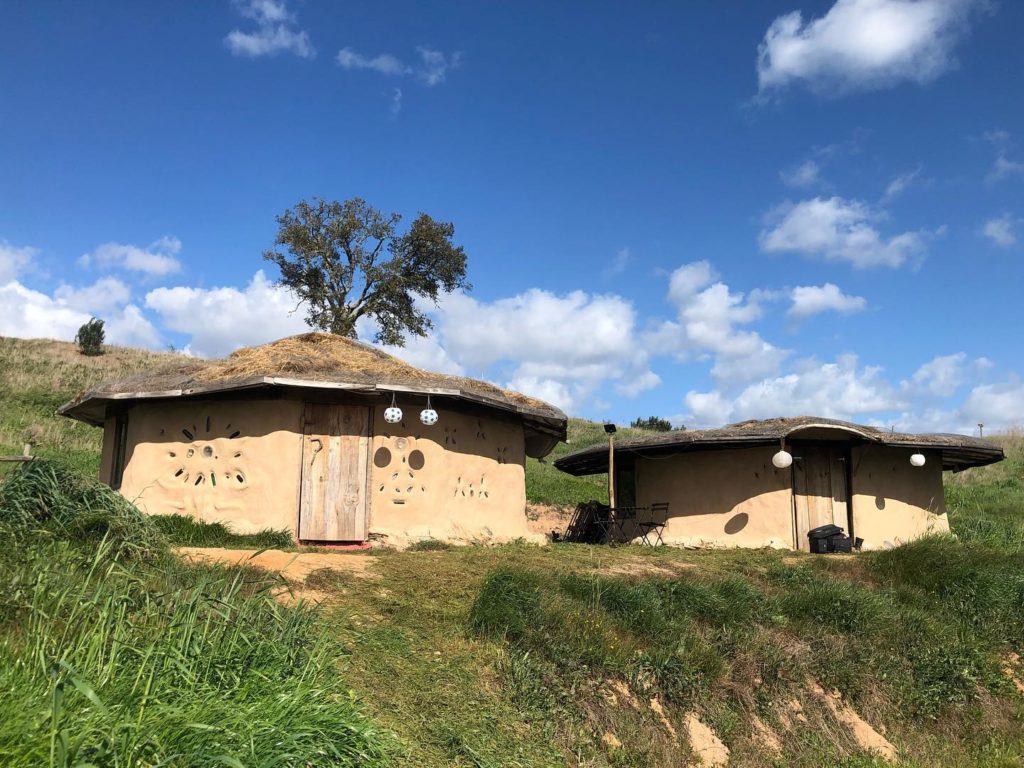
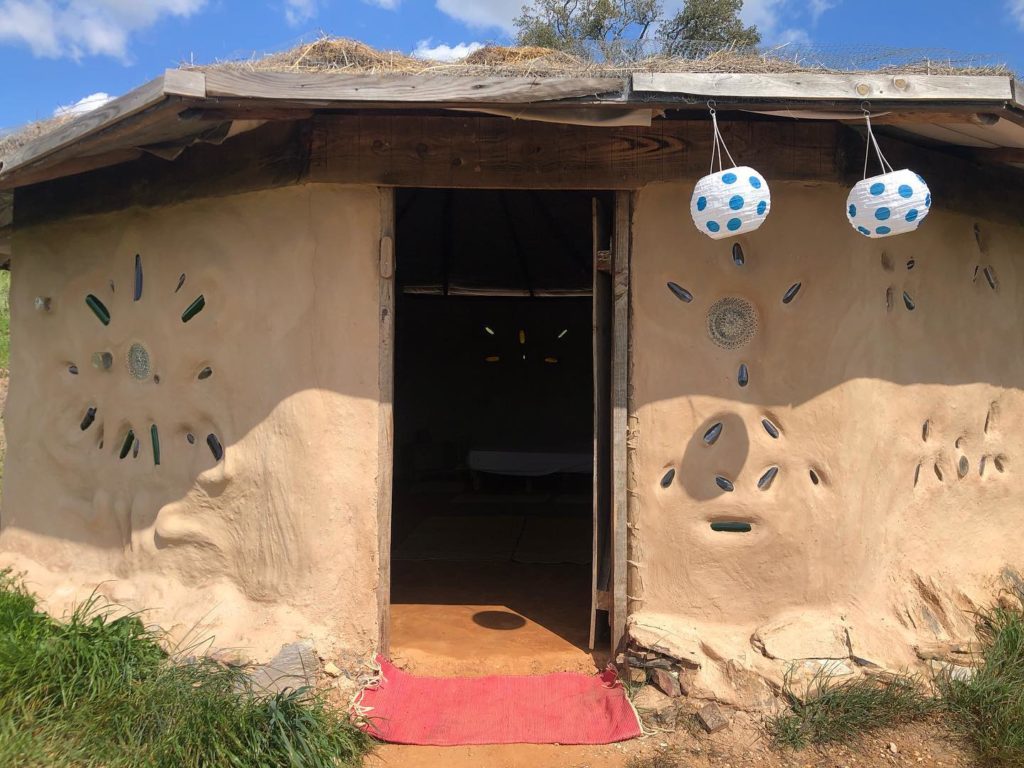
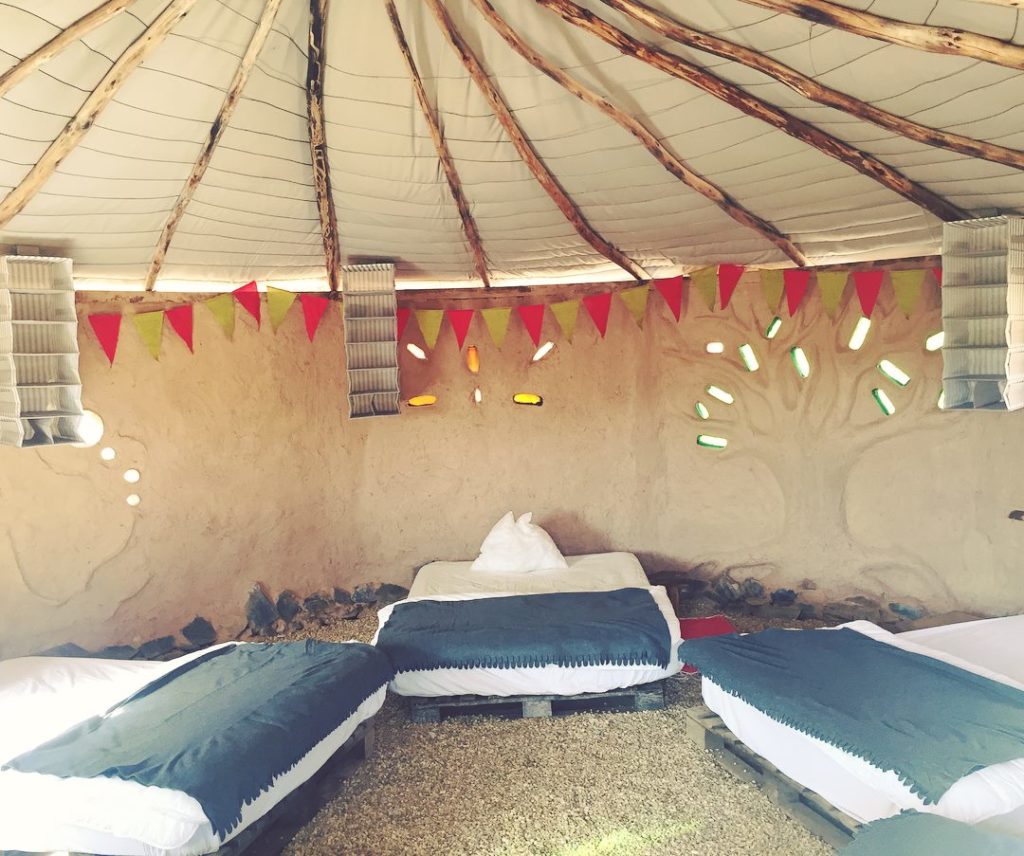
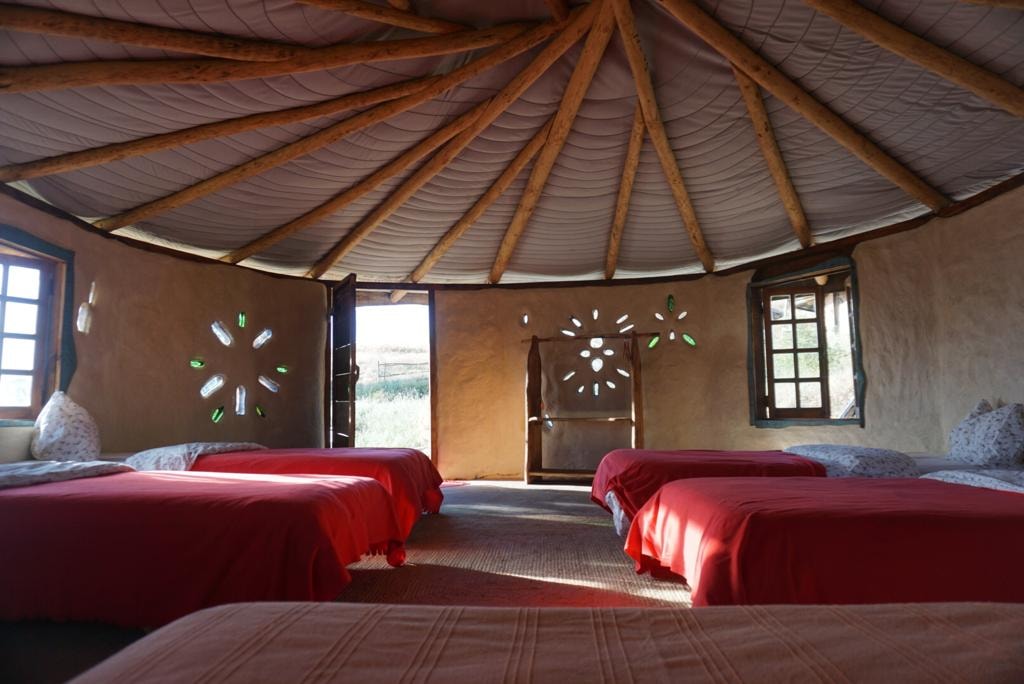
The Food
Fresh vegetarian food will be provided and sourced from the farm and local markets throughout the course.
Special dietary needs can be accommodated. Please let us know in advance.
 surpluspermaculturedesign
surpluspermaculturedesign